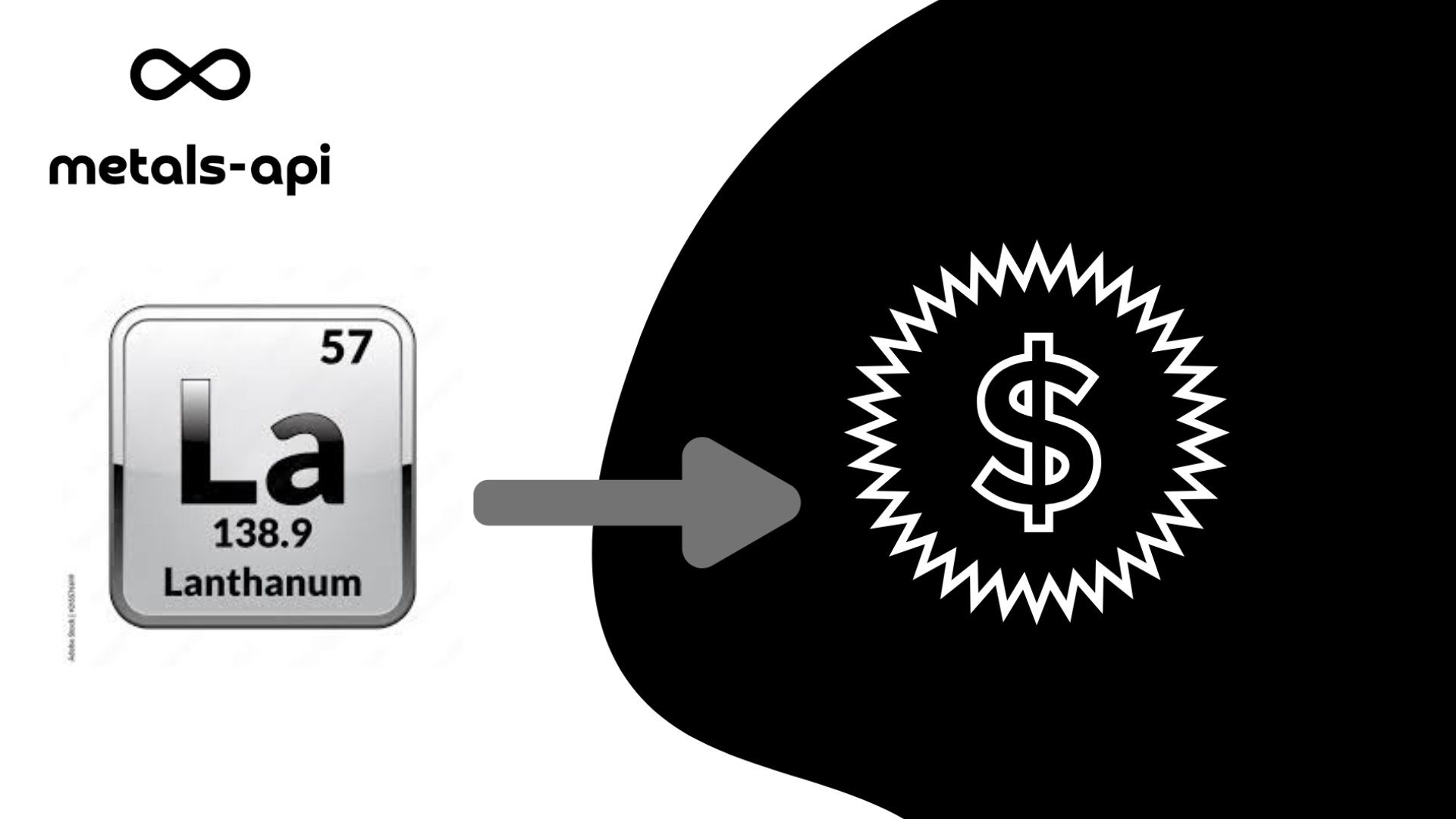Lanthanum Rate API: Access Accurate Lanthanum Prices

In the dynamic world of rare earth elements, lanthanum stands out due to its critical applications in various high-tech industries, including electronics, automotive, and renewable energy. Accurate and real-time lanthanum pricing is essential for businesses and developers in these sectors. The API provides a reliable solution for accessing up-to-date lanthanum prices through its comprehensive API. This post explores the importance of lanthanum market data, the features of Metals-API, and how to integrate this powerful tool into your applications.
Why Accurate Lanthanum Prices Matter
Lanthanum is a vital component in many modern technologies. Having access to precise pricing data is crucial for several reasons:
- Cost Management: Keeping track of lanthanum prices helps businesses manage production costs effectively.
- Strategic Planning: Accurate pricing data aids in making informed strategic decisions and long-term planning.
- Market Analysis: Understanding market trends and price movements is essential for staying competitive.
- Investment Decisions: Investors rely on accurate data to make sound investment choices in the rare earth elements market.
Lanthanum Rate API: Access Accurate Lanthanum Prices with Metals-API
Introducing Metals-API: Your Source for Lanthanum Prices
Metals-API is a leading provider of real-time and historical price data for a wide range of metals, including lanthanum. Its API offers seamless integration and delivers reliable pricing data, making it an invaluable resource for developers and businesses.
Understanding the Lanthanum Rate API
What is the Lanthanum Rate API?
Lanthanum Rate API is a specialist API offered by Metals-API, a major source of precious metal rates and currency conversion data. Lanthanum Rate API, which is specifically customized to lanthanum rates, provides customers with real-time and historical data so they can precisely watch lanthanum prices and make informed investment decisions.
How Does It Work?
Lanthanum Rate API works by connecting to multiple data sources and financial markets in real time. Users can submit API queries with criteria like the desired date range and data format. The API then obtains the desired lanthanum rate data from its sources and presents it to the user in a structured manner that may be easily integrated into applications or analytical tools.

Benefits Of Using Metals-API For Lanthanum Prices
- Enhanced Decision-Making: Access to accurate and timely data enables businesses to make informed decisions, reducing risks and optimizing operations.
- Improved Efficiency: Automating data retrieval through an API minimizes manual data entry, saving time and resources.
- Scalability: Metals-API can be seamlessly integrated into various applications, scaling to meet the growing needs of businesses.
- Competitive Advantage: Staying updated with real-time data helps businesses remain agile and competitive in the market.
Practical Applications
- Electronics Manufacturing: Keep track of lanthanum prices to optimize procurement and successfully control manufacturing expenses.
- Automotive Industry: Monitor pricing variations to make educated material procurement and cost management decisions.
- Investment platforms: Provide investors with real-time data so they can make better decisions.
- Market Analysis: Conduct extensive market analysis and forecasts using both historical and real-time data.
How To Integrate Metals-API For Lanthanum Prices
Step 1: Sign Up and Obtain an API Key
To begin using Metals-API, sign up on the Metals-API website and obtain your unique API key. This key is necessary for authenticating your API requests.
Step 2: Review the API Documentation
Familiarize yourself with the API documentation provided by Metals-API. Understanding the available endpoints, parameters, and response formats is crucial for successful integration.
Step 3: Set Up Your Development Environment
Ensure your development environment is configured to make HTTP requests. Use tools and libraries appropriate for your programming language.
Step 4: Implement the API in Your Application
Using the API key and documentation, implement API calls in your application. Here’s a sample code snippet in Python to get you started:
api_key = 'YOUR_API_KEY'
base_url = 'https://metals-api.com/api/latest'
params = {
'access_key': api_key,
'base': 'USD',
'symbols': 'LANTHANUM'
}
response = requests.get(base_url, params=params)
data = response.json()
if response.status_code == 200:
lanthanum_price = data['rates']['LANTHANUM']
print(f"Current price of Lanthanum: ${lanthanum_price} USD")
else:
print(f"Failed to retrieve data: {data['error']['info']}")
Replace 'YOUR_API_KEY' with your actual API key to fetch the latest lanthanum price data.
Advanced Implementation: Retrieving Historical Data
For advanced use cases, such as analyzing market trends or setting up automated alerts for price changes, Metals-API offers various endpoints and features. Here’s an example of how to retrieve historical data:
api_key = 'YOUR_API_KEY'
base_url = 'https://metals-api.com/api/timeseries'
params = {
'access_key': api_key,
'base': 'USD',
'symbols': 'LANTHANUM',
'start_date': '2023-01-01',
'end_date': '2023-12-31'
}
response = requests.get(base_url, params=params)
data = response.json()
if response.status_code == 200:
historical_prices = data['rates']
for date, price in historical_prices.items():
print(f"Price on {date}: ${price} USD")
else:
print(f"Failed to retrieve data: {data['error']['info']}")
Conclusion
Integrating Metals-API for lanthanum market data into your applications can significantly enhance your decision-making processes, provide a competitive edge, and streamline operations. With its real-time and historical data, global coverage, and high reliability, Metals-API simplifies data access for developers and businesses alike. By following the steps outlined above, you can seamlessly integrate this powerful tool into your workflows and stay ahead in the dynamic market of rare earth elements. Start leveraging Metals-API today to drive success and innovation in your industry.